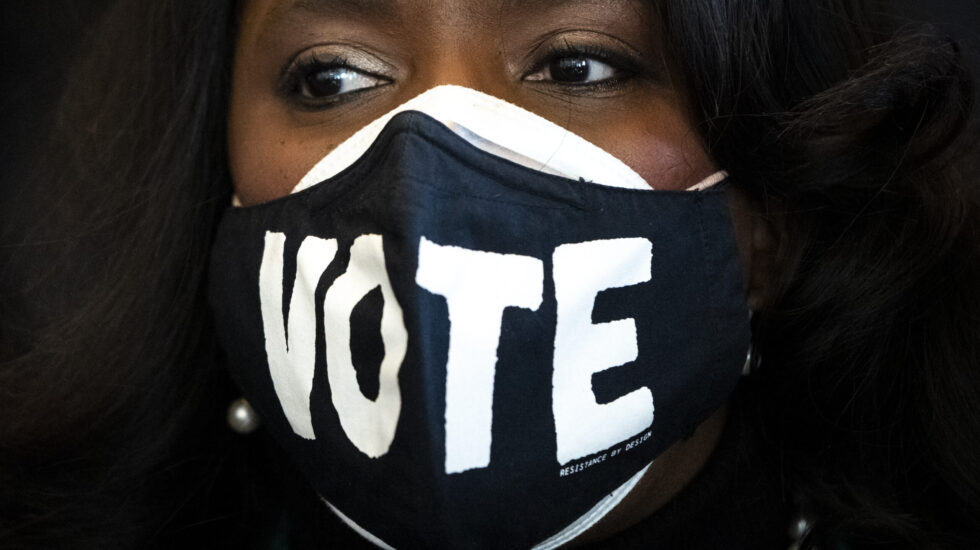Senate Democrats mounted an impassioned but ultimately futile attempt to pass voting rights legislation on Wednesday as they couldn’t overcome Republican opposition or convince their full caucus – namely, Sens. Joe Manchin and Kyrsten Sinema – to temporarily alter the filibuster in order to approve the proposed laws with a bare 51-vote majority.
The New York Times reports:
Though the twin defeats were never in doubt, Democrats pushed forward in an effort to highlight what they called a crisis in voting rights and to underscore the refusal of Republicans to confront it. They did succeed in forcing the Senate for the first time to debate the bill, leading to hours of raw and emotional arguments on the floor over civil rights, racism and how elections are conducted.
“The people of this country will not tolerate silencing,” said Senator Amy Klobuchar, Democrat of Minnesota and a chief author of the voting bill. “I think by voting this down, by not allowing us even to debate this, to get to the conclusion of a vote, that is silencing the people of America, all in the name of an archaic Senate rule that isn’t even in the Constitution. That’s just wrong.”
(To learn more about the two voting rights bills at the center of the controversy, read our explainer.)
Manchin, who supports the legislation but has balked at changing Senate rules to pass it, defended his refusal to lift the filibuster. “I cannot support such a perilous course for this nation when elected leaders are sent to Washington to unite our country, not to divide our country,” he said during debate in the upper chamber. “We’re called the United States, not the divided states, and putting politics and party aside is what we’re supposed to do.”
Sinema did not speak during Wednesday’s debate, but released a statement with a similar sentiment, saying changing filibuster rules “would deepen our divisions and risk repeated radical reversals in federal policy, cementing uncertainty and further eroding confidence in our government.”
In a rare move, House members of Congressional Black Caucus sat-in on the Senate discussion. When a reporter asked if they were disappointed with the “two senators” blocking the bills, they responded, “52 senators! 52 senators!”
The Hill explains:
While they’re frustrated with Manchin and Sinema, CBC members say they won’t let the other 50 GOP senators off the hook. It’s a message being echoed by Democratic leaders, who are also accusing Republicans of seeking to deny Americans one of their most fundamental constitutional rights.
“We see Republicans trying to undermine the right of citizens to vote, and that’s why it’s not passing,” House Minority Leader Steny Hoyer (D-Md.) told reporters Wednesday, rejecting the notion that Manchin and Sinema are the only figures standing in the way.
Democrats maintain that voting rights are inextricably linked to civil rights because a spate of new state laws across the country have made it more difficult for minorities to cast their ballots.
Republicans have strenuously rejected that their opposition to the proposed voting rights laws is racially-motivated.
“I am not a racist,” said Senator John Thune of South Dakota, the No. 2 Senate Republican. “Nor are the people who I know in the state of South Dakota.”
One of the most impassioned exchanges during Wednesday’s debate occurred between two Black senators, Republican Tim Scott and Democrat Cory Booker. The Washington Post explains:
In one notable speech, Sen. Tim Scott (R-S.C.) accused Democrats of peddling a “negative, false narrative of what is happening to America” by referring to the new state laws as “Jim Crow 2.0” and making comparisons to the depravities suffered by Black Americans before and during the civil rights era.
“As I keep hearing the references to Jim Crow, I ask myself how many Americans understand what Jim Crow was,” said Scott, the Senate’s only Black Republican, calling the comparison “offensive not just to me or Southern Americans, but offensive to millions of Americans who fought, bled and died for the right to vote.”
That drew a response from Cory Booker (D-N.J.), a fellow Black senator, who countered that Democrats were simply dealing with the fact that “it is more difficult for the average African American to vote than the average White American.”
“Don’t lecture me about Jim Crow,” he said later. “I know this is not 1965. That’s what makes me so outraged — it’s 2022 and they’re blatantly removing more polling places from the counties where Blacks and Latinos are overrepresented. I’m not making that up. That is a fact.”
In a statement, President Joe Biden said he was “profoundly disappointed that the United States Senate has failed to stand up for our democracy.”
“I am disappointed — but I am not deterred,” he said, adding that “in state after state, Republican state legislatures are engaged in an unprecedented effort to suppress the sacred right to vote and subvert the American bedrock of free and fair elections.”
Biden indicated on Wednesday that he could expand voting rights through executive orders, but he declined to share details.



